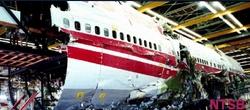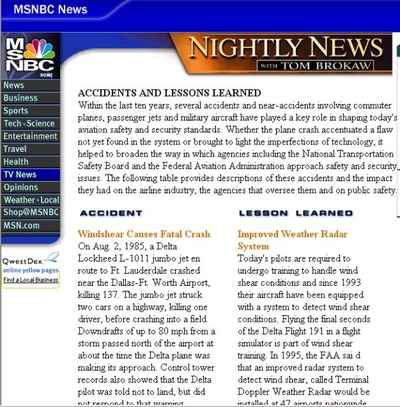Wed, Jul 23, 2003
MSNBC Tries to Tackle the Flight Safety Issue, All at Once
NBC had the right idea, setting up a "What have we learned?"
page that addresses a number of concerns prospective airline fliers
might have.
T
 he premise: have a look at a famous
accident, dissect it, and demonstrate what was learned.
he premise: have a look at a famous
accident, dissect it, and demonstrate what was learned.
Many famous crashes are featured: Pan Am 103, TWA Flight 800,
ValuJet 592, USAir 427... The path to the problem is presented in
fairly dumbed-down terms (this is a general-audience piece,
remember?), but the "Lesson Learned" is presented in a
generally reasonable way.
It's a gruesome trip down memory lane, as the horrors of one bad
crash after another are tossed back at us; but the final impression
left is one of, "Thank goodness they've fixed it so that
won't ever happen again!" No doubt, the airlines will like it.
Our only serious gripe is NBC's evident tendency to use writers
whose aviation background is obviously lacking, and therefore to
exaggerate or mischaracterize certain aspects of some of the
accidents. For instance, when a pair of F-16s nearly clobbered a
Nation's Air 727 off New Jersey in 1997, mention of the
airliner's TCAS was made, showing no understanding of the system --
or of the consequences of the system's not working: "The approach
of the F-16s triggered the 727's T-CAS (Traffic Alert and Collision
Avoidance System), which advised the passenger plane's crew to
dive, climb and dive again to avoid a collision. After doing so,
two flight attendants and a passenger were thrown to the cabin
floor and were slightly injured. Though the T-CAS alarms were meant
to increase safety and prevent collisions in mid-air, in this case,
they created grave risk." NBC's writers missed the obvious: a lot
worse could have happened.

Anyway, it's an interesting read, for the most part, and
probably does more good than harm.
More News
Also: Netherlands Donates 18 F16s, 2 737s Collide On Ramp, E-7 Wedgetail Cut, AgEagle's 100th In S Korea The Pilot and Aircraft Privacy Act was introduced in the House by Represent>[...]
Pilot Also Reported That Due To A Fuel Leak, The Auxiliary Fuel Tanks Were Not Used On June 4, 2025, at 13:41 eastern daylight time, a Piper PA-23, N2109P, was substantially damage>[...]
Have A Story That NEEDS To Be Featured On Aero-News? Here’s How To Submit A Story To Our Team Some of the greatest new stories ANN has ever covered have been submitted by our>[...]
From 2023 (YouTube Edition): Reflections on War’s Collective Lessons and Cyclical Nature The exigencies of war ought be colorblind. Inane social-constructs the likes of racis>[...]
What Goes Around, May Yet Come Back Around, Klyde FMI: www.klydemorris.com>[...]
 Airborne 06.30.25: US v ADS-B Misuse, Natl STOL Fire, Volocopter Resumes
Airborne 06.30.25: US v ADS-B Misuse, Natl STOL Fire, Volocopter Resumes NTSB Prelim: Piper PA-23
NTSB Prelim: Piper PA-23 ANN FAQ: Submit a News Story!
ANN FAQ: Submit a News Story! Classic Aero-TV: One Mans Vietnam
Classic Aero-TV: One Mans Vietnam Klyde Morris (06.30.25)
Klyde Morris (06.30.25)




